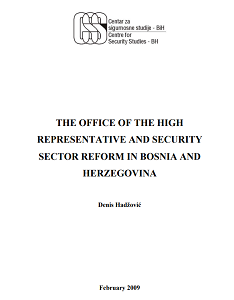The Office of the High Representative and Security Sector Reform in Bosnia and Herzegovina
The Office of the High Representative and Security Sector Reform in Bosnia and Herzegovina
Author(s): Denis Hadžović
Subject(s): Governance, Military history, Political history, Government/Political systems, Security and defense, Transformation Period (1990 - 2010)
Published by: Centar za Sigurnosne Studije
Keywords: BiH; security sector; policy; reform; high representative;
Summary/Abstract: In the after-math of conflict, Bosnia and Herzegovina (BiH) made significant progress in the development and sustainment of a peaceful environment; a progress that can be indicated, amongst others, with the establishment of state-level institutions in the field of security. Their inception represents, firstly, a conflict-prevention element and secondly a vital instrument that can be utilised towards Euro-Atlantic integrations. To that end, immeasurable support has been provided by the international community, primarily through the Office of the High Representative (OHR) in BiH, an ad hoc institutions that were established to overlook the implementation of the civil component of the Dayton Peace Accords. With the efforts of the OHR and international community, BiH has executed one of the most successful reforms of the judicial system in the region. It has also seen the establishment of a unified armed force and intelligence-security agency, a state protection and a investigation agency, state border police, customs control and the state court. All of these institutions were established either following a direct legislative instruction or indirect pressure from the OHR operating under a quest to reach a compromise between the ruling political actors in Bosnia and Herzegovina. With these accomplishments in mind, the intention of the author was to offer practitioners and academics who deal with peacebuilding a modest contribution in view of supporting the further development of these processes, and present an insight into the OHR experience gained during the implementing period of these reforms and peacebuilding in BiH, with particular focus on security sector reform. I would like to use this opportunity to express my gratitude to the Geneva Centre for the Democratic Control of Armed Forces (DCAF) on their financial support of this research, as well as to the staff of the Centre for Security Studies, Mr. Armin Krzalic, Mr. Jasmin Ramovic, Ms. Sanja Mihajlovic, Ms. Lana Tancica and Ms. Andrea Tefterdarija, who worked in the capacity of a junior professional during the period of the research, on their invaluable contributions. Our gratitude is also extended to everyone who directly or indirectly contributed to the implementation of the research, either through interviews or literature that was used for the needs of the research, and library of PSOTC – Peace Support Operations Training Centre Sarajevo. We sincerely hope this research, which also encompassing a local perspective, will serve as a contribution to discussions regarding peacebuilding and security sector reform in post-conflict societies.
Series: Centar za Sigurnosne Studije - MISCELLANEOUS PAPERS
- Page Count: 84
- Publication Year: 2009
- Language: English
- Content File-PDF

